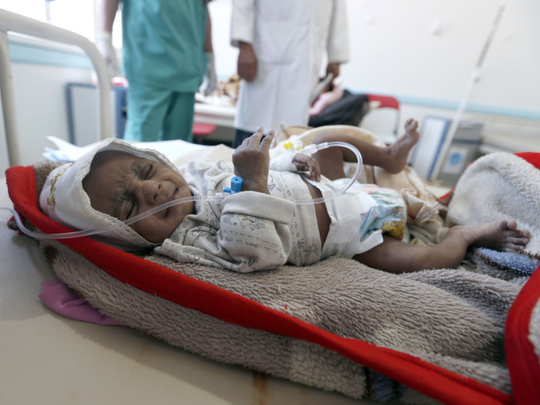
Dubai: The Emirates Red Crescent (ERC) is continuing to provide medical assistance, supplies and cholera treatment medicines to the Mokha hospital in the Taiz governorate.
The medical assistance is part of the ERC’s sustained efforts to contain the cholera outbreak in several governorates in the country.
Health officials at Mokha hospital expressed gratitude to the UAE leadership, government and people as well as to the ERC for mobilising resources and energies to meet requirements to control the cholera outbreak in collaboration with the World Health Organisation.
They said the urgent medical assistance was delivered in a critical time for the health sector in Yemen.
Cholera deaths in war-torn Yemen have surged into the hundreds, more than a quarter of Yemenis face famine, and parents are selling girls into marriage to buy food, the United Nations said on Tuesday.
The description of Yemen by the top UN aid official, Stephen O’Brien, the undersecretary-general for humanitarian affairs and emergency-relief coordinator, was perhaps his most dire yet in a series of alarming updates on the crisis.
“If there was no conflict in Yemen, there would be no descent into famine, misery, disease and death — a famine would certainly be avoidable and averted,” O’Brien told the UN Security Council.
“The people of Yemen are being subjected to deprivation, disease and death as the world watches,” he said.
Saudi Arabia and its Arab allies have vowed to crush Al Houthi militants, seeing them as proxies for Iran’s influence in the region.
The Saudis have pledged to retake all territory seized by Al Houthis, who are from the north of Yemen, and reinstate the Saudi-backed government that was forced to flee the capital, Sana’a, in 2015.
Last week, the Saudis received a strong signal of US support when President Donald Trump visited Saudi Arabia and signed a $110-billion weapons deal, including warplanes and armaments that could presumably be deployed in the Yemen conflict.
For O’Brien and other international aid advocates, the conflict has become the world’s largest food security crisis, which has now been aggravated by a fast-spreading cholera outbreak.
Less than a month ago, the World Health Organisation reported nearly 800 cases and at least 34 deaths from cholera, which causes fatal dehydration from water contaminated by faeces.
On Tuesday, O’Brien and other UN officials said the cholera death toll now approached 500, with roughly 60,000 cases, and they forecast 150,000 new cases in the next six months.
O’Brien also told the Security Council that more than 17 million Yemenis were “food insecure” — which means they lack a reliable supply — and 6.8 million were “one step away from famine.”
The country’s population is roughly 25 million.
Many simply cannot afford to buy food, O’Brien said, and more than one million civil servants have not been paid for months, pushing more people towards acute hunger and worse.
“Families are increasingly marrying off their young daughters to have someone else care for them and often use the dowry to pay for basic necessities,” he said.
The UN special envoy for Yemen, Esmail Ould Shaikh Ahmad, who also briefed the council, said he saw no sign the warring parties were willing to compromise.
“I will not hide from this council that we are not close to a comprehensive agreement,” he said.
Last week, gunmen in Sana’a shot at the special envoy’s car shortly after he had arrived in an effort to restart negotiations. The Saudi news media described the attack as an Al Houthi attempt to assassinate him.
Ould Shaikh Ahmad, who was not hurt, told the council the shooting had reinforced his intent to find “a peaceful end to the war”.
— With inputs from agencies












